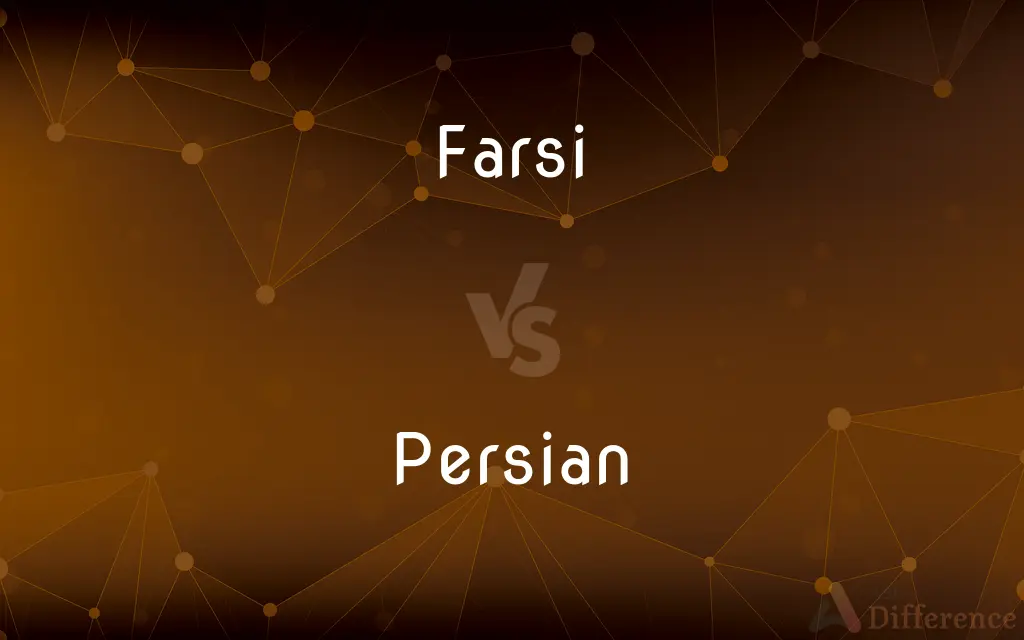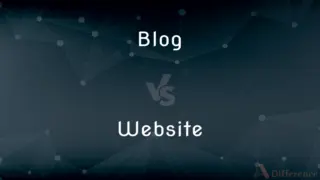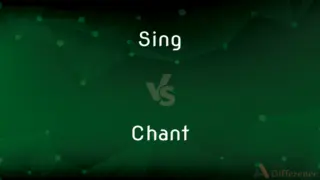Farsi vs. Persian — What's the Difference?
Edited by Tayyaba Rehman — By Fiza Rafique — Updated on April 18, 2024
Farsi and Persian refer to the same language, but "Farsi" is the native name in Iran, while "Persian" is more commonly used in Western languages.

Difference Between Farsi and Persian
Table of Contents
ADVERTISEMENT
Key Differences
Farsi is the endonym for the Persian language, primarily used within Iran and among its speakers. On the other hand, Persian is the exonym commonly used in English and other Western languages to describe the same language.
While Farsi is the term used in everyday context within Iran and by Persian speakers around the world, Persian is often employed in academic and formal international contexts.
The term Farsi directly comes from the local linguistic roots, reflecting its cultural and regional identity. Whereas, Persian connects to a broader historical context, often invoking the rich heritage of the Persian Empire.
In terms of linguistic classification, both Farsi and Persian belong to the Iranian branch of the Indo-European languages. However, the use of the term Farsi is seen as more authentic within native-speaking environments.
The usage of the term Farsi versus Persian can sometimes reflect political or cultural nuances. For instance, Persian might be used to emphasize the language’s historical breadth and cultural impact across regions and epochs.
ADVERTISEMENT
Comparison Chart
Usage
Native term in Iran
Common in Western contexts
Context
Informal, local
Formal, international
Linguistic Origin
Directly from Persian roots
Via English from Old French
Cultural Connotation
Modern, regional identity
Historical, imperial connotations
Political Implications
Neutral or nationalistic
Broadly diplomatic, historical
Compare with Definitions
Farsi
The modern form of the Persian language.
Farsi includes many Arabic loanwords, unlike its ancient counterparts.
Persian
The broader term encompassing various dialects, including Dari and Tajik.
Persian dialects vary slightly from region to region.
Farsi
Official language of Iran.
Farsi is taught in schools and used in government in Iran.
Persian
Often used in a scholarly context outside of Iran.
Universities offer courses in Persian studies.
Farsi
A branch of the Iranian languages spoken primarily in Iran and Afghanistan.
He learned to speak Farsi fluently while living in Tehran.
Persian
The cultural and historical language of Iran, reflecting its imperial past.
Persian has evolved over centuries but retains many classical elements.
Farsi
A language of rich literary tradition, including both classical and contemporary works.
Farsi poetry often reflects themes of love and divine reflection.
Persian
An Indo-European language historically spoken across the Persian Empire.
Ancient Persian texts provide insights into the empire’s society.
Farsi
Used informally among speakers within regional contexts.
In conversations, she switches between English and Farsi seamlessly.
Persian
A language with significant contributions to art, music, and literature.
Persian miniature paintings are renowned worldwide.
Farsi
The modern form of the Persian language, especially the western dialect of Persian that is the national language of Iran.
Persian
Of or relating to Persia or Iran, or to their peoples, languages, or cultures.
Farsi
A person of Iranian descent;
Many Farsi emigrated to India near Bombay
Persian
A native or inhabitant of Persia or Iran.
Farsi
The language of Persia (Iran) in any of its ancient forms
Persian
The western dialect of this language that is the national language of modern Iran. Also called Farsi.
Persian
The eastern dialect of this language spoken in Afghanistan and Pakistan. Also called Dari.
Persian
A domestic cat of a large breed originally from the Middle East, having a long flowing coat and a broad head with a snub nose.
Persian
Of or pertaining to Persia, to the Persians, or to their language.
Persian
A native or inhabitant of Persia.
Persian
The language spoken in Persia.
Persian
A thin silk fabric, used formerly for linings.
Persian
A native or inhabitant of Iran;
The majority of Irani are Persian Shiite Muslims
Persian
The language of Persia (Iran) in any of its ancient forms
Persian
Of or relating to Iran or its people or language or culture;
Iranian mountains
Iranian security police
Common Curiosities
What is the historical significance of the Persian language?
Persian has a storied history as the language of major empires in the region, influencing art, culture, and governance across Central Asia and the Middle East.
Are there any major literary works written in Persian?
Yes, Persian literature includes major works like the poems of Rumi, Hafez, and the epic Shahnameh by Ferdowsi.
What role does Persian play in Islamic culture?
Persian was historically a major cultural and scholarly language in the Islamic world, crucial for literature, science, and philosophy during the Islamic Golden Age.
How similar are Farsi, Dari, and Tajik?
Farsi, Dari, and Tajik are all dialects of Persian, with Dari spoken in Afghanistan and Tajik in Tajikistan, sharing a high degree of mutual intelligibility.
Are Farsi and Persian mutually intelligible with Arabic?
Farsi and Persian, while containing many Arabic loanwords, are not mutually intelligible with Arabic due to different grammar and language family origins.
Has Persian influenced other languages?
Yes, Persian has significantly influenced other languages in the region, including Urdu, Hindi, and Turkish, among others.
What is the future of the Persian language in global communication?
Persian continues to be relevant due to Iran's strategic geopolitical and cultural significance, maintaining its presence in global communication.
Is Persian written in the same script across all countries where it's spoken?
Persian is primarily written in the Arabic script in Iran and Afghanistan, while Tajikistan uses a Cyrillic script.
Is Persian easy to learn for English speakers?
Persian grammar is straightforward compared to many languages, but the vocabulary and script can pose challenges for English speakers.
What is the role of Persian in the arts?
Persian has a profound influence on the arts, particularly in poetry, music, and visual arts, known for its detailed craftsmanship and poetic expressions.
How does the vocabulary of Farsi compare to classical Persian?
Modern Farsi contains many loanwords from Arabic and other languages, whereas classical Persian has a purer Indo-European vocabulary.
What are some common phrases in Farsi?
Common Farsi phrases include "Salam" (Hello), "Khoda Hafez" (Goodbye), and "Merci" (Thank you).
How is Persian taught in academic settings outside of Iran?
Persian is often taught focusing on both modern and classical forms, with courses available in universities worldwide, particularly in Middle Eastern studies programs.
What are the dialectical differences within Farsi spoken in Iran?
There are several regional dialects of Farsi in Iran, including Tehrani, which is considered the standard form, and regional variations like those spoken in Esfahan and Shiraz.
Can learning Farsi benefit career opportunities?
Learning Farsi can be beneficial for careers in diplomacy, international business, military intelligence, and academic research related to the Middle East.
Share Your Discovery

Previous Comparison
Blog vs. Website
Next Comparison
Sing vs. ChantAuthor Spotlight
Written by
Fiza RafiqueFiza Rafique is a skilled content writer at AskDifference.com, where she meticulously refines and enhances written pieces. Drawing from her vast editorial expertise, Fiza ensures clarity, accuracy, and precision in every article. Passionate about language, she continually seeks to elevate the quality of content for readers worldwide.
Edited by
Tayyaba RehmanTayyaba Rehman is a distinguished writer, currently serving as a primary contributor to askdifference.com. As a researcher in semantics and etymology, Tayyaba's passion for the complexity of languages and their distinctions has found a perfect home on the platform. Tayyaba delves into the intricacies of language, distinguishing between commonly confused words and phrases, thereby providing clarity for readers worldwide.
















































